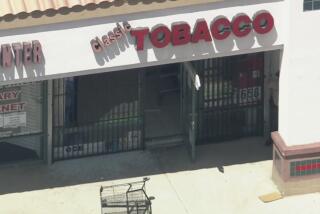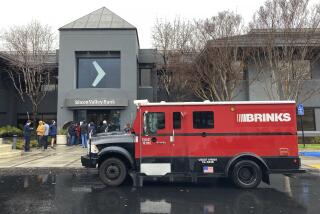Trooper Kills Himself Over a Gun Check
- Share via
NORFOLK, Neb. — A state trooper killed himself Friday in despair over botching a gun check on a man who later allegedly took part in a deadly bank robbery.
Trooper Mark Zach committed suicide a day after three men stormed into a local branch of U.S. Bank and fatally shot four bank employees and one customer.
Zach had stopped one of the suspected gunmen, Erick Fernando Vela, on a traffic violation last week. At that time, he arrested Vela for carrying a concealed weapon. But when he entered the gun’s serial number into a police computer, Zach transposed two digits.
Had he entered the correct numbers, he would have learned that the gun was stolen and Vela would have been charged with a more serious offense that might have kept him in jail longer. As it was, Vela was able to post bond after just a few hours in custody.
After Vela was arrested in connection with Thursday’s holdup, friends said Zach was devastated. He killed himself with his service revolver in a field outside Norfolk at lunchtime on a gorgeous fall day.
Zach, 35, left behind his wife and six young children and stepchildren.
Four of the victims of the bank robbery also left behind children. The fifth had married last month.
“And so, tragedy compounds tragedy,” Gov. Mike Johanns said.
He was driving to visit the trooper’s widow. To sit with her. To pray with her. “There’s not much more we can do,” he said.
“To see so much suffering. Those poor families [of the victims in the bank] ... and now, one more added to the list,” Johanns said, his voice trailing off into the night. “So senseless. So very senseless.”
Authorities were quick to note that even if Zach had flagged the stolen weapon, Vela might still have been able to post bond quickly. To assume that he would have remained in jail longer--or that the bank robbery would have been foiled--is “pure speculation,” said Terri Teuber, a spokeswoman for the Nebraska State Patrol.
The weapon Vela was allegedly concealing when Zach stopped him remains locked up in an evidence room. It was not used in the bank robbery.
“Mark, being the trooper he is, felt he had done something wrong, and that’s just not the case,” the governor said.
Zach was a 12-year veteran of the patrol force; he also served on his union board. “An outstanding trooper,” said Johanns, who had met with him earlier this month on union issues.
News of Zach’s suicide hit hard after an exhausting, emotional day of disclosures about the robbery.
Norfolk Police Capt. Steve Hecker said the holdup began with one young man casing the bank. The scout then relayed information--presumably about where each employee was stationed--to his three accomplices by walkie-talkie, Hecker said.
Moments later, they burst in through the double glass doors. Within 40 seconds, they had shot all five victims in the head.
“It went to hell,” one of the suspects later told police.
The three alleged gunmen were captured several hours later, in a stolen pickup, as they stopped at a gas station 75 miles away. Investigators found three handguns in the roadside weeds along the getaway route, though they have not conclusively linked the weapons to the crime.
A fourth suspect, believed to be the scout, was arrested Friday morning in Norfolk.
Authorities did not recover any significant sum of cash from the men, and Police Chief Bill Mizner said bank records were still being audited to determine whether any money was stolen.
The suspects were identified as Vela, who is 21; Jose Sandoval, 23; Jorge Galindo, 21; and Gabriel Rodriguez, 26.
The men were led into a packed rural courthouse Friday morning for a bond hearing. A Spanish-language interpreter explained the five counts of murder each of them will face--charges that could carry the death penalty.
A daughter of one of the victims wept.
District Judge Richard Krepela ordered all four men held without bail.
As investigators tried to pull together the story behind the robbery--which Hecker said had been in the works for at least two weeks--Norfolk residents remained deeply shaken.
The sign outside the U.S. Bank branch on 13th Street still flashed enticements for loans and credit cards. But a police officer stood somber guard outside the smashed glass door. And in the parking lot, just beyond the crime-scene tape, mourners had left bouquets of flowers.
“People are in a state of shock,” said Warren Cook, 86, a former mayor. “It’s very depressing to everyone.”
The locals are mourning, first and foremost, the victims. But they’re also mourning the small-town life their community has outgrown.
A onetime farm community, Norfolk struggled for years to attract industry and jobs. It succeeded--but at a price. The town has grown to an industrial hub of 24,000--and now finds itself battling drugs and violence, prejudice and fear.
“It’s sad to see this [community] grow up to be a city. That’s what has happened, and we don’t like it,” said Tony Wortmann, 50, a farmer and radio engineer. “We don’t need these big-city problems.”
Thursday’s tragedy was of a magnitude all its own--the deadliest bank robbery ever in Nebraska. Still, there have been four other homicides in or near Norfolk in the last three years, all of them drug related, Mizner said.
“We’ve seen the violence increasing,” he said.
Lifelong locals tend to blame the crime on new arrivals drawn from much bigger Midwest cities to jobs at Norfolk’s meatpacking or manufacturing plants. Many of the newcomers are of Mexican heritage, but there are growing Somali and Sudanese populations as well.
Just a dozen years ago, the town was virtually all white. Now, at least 10% of the population is minority, said Mayor Gordon Adams, a retired surgeon.
The diversity has caused some tension. Schools struggle to hire enough teachers for students who speak little English. Landlords complain that foreign tenants need to be taught how to mow the lawn and use the garbage disposal.
But Norfolk also hosts an annual Ethnic Fair to celebrate the new cultures settling into Great Plains life.
And the Latino population, which has been in town the longest, has begun to integrate neighborhoods and businesses.
Adams worries that such progress could be set back by the brutal robbery.
At least three of the suspects are longtime residents of the area. All four are Latino “and that gives some of the people who are prejudiced some ammunition, you might say,” Adams said. “It fans the fires of racial intolerance.”
Shopping at a Mexican market, a 47-year-old woman who was afraid to give her name said that she too feared a backlash.
“I think, with this happening, they are going to treat us badly,” she said in Spanish.
“They already don’t want us here,” the store clerk, a teenager, put in.
“Relations weren’t very good before,” the shopper concluded, “but now they’re going to get worse.”
Down the street in her consignment shop, 64-year-old Carol Auen said she gives the community more credit than that.
“I think the majority of us will be able to carry on good relations,” she said.
But, Auen acknowledged, “there could be a few problems. Because those men did do such a terrible thing--such a senseless, senseless act.”
More to Read
Sign up for Essential California
The most important California stories and recommendations in your inbox every morning.
You may occasionally receive promotional content from the Los Angeles Times.










